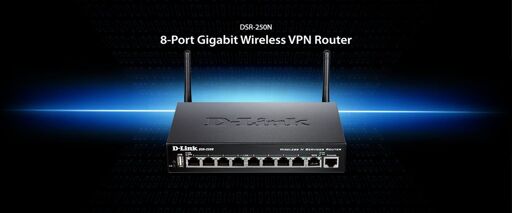a new non dlink router. Since the should be named f-link for a number of reasons.
Cool, so what brand is a good one to replace D-Link with?
Mikrotik and Ubiquity
Tplink is widely supported by openwrt
I have a fourth generation I7 with 8gb of ram running pfsense. Its free and you can’t beat it for baked in capabilities. I run pfblocker ng and snort to block ads maleware and useless(to me) telemety that my non linux machines send in regularly. Microsoft, Amazon and others. I also have wiregurad for vpn access to my home. You can also install the ntopng package and get really good realtime information on what is going on on your network. For years I used open wrt but the two don’t really compare. If you had to compare, openwrt is like a geo metro and pfsense is like a sports car.
Okay so the 2015 EOL ones, yeah I can understand telling the customer to update their shit. They shouldn’t have to support nearly 10 year out of date stuff.
May 2024 EOL ones? Bruh. C’mon now.
Hopefully there’s a mistake in the article.
- It does claim they were both discontinued this year and reached end of support this year. If that’s true, that’s huge and there should be consequences in the market.
- if the article is poorly written and the only concern is they already passed end of support so are no longer being supported , that seems like a tautology.
I would love to know when they stopped selling it compared to the EOL. EOL should be at least 5 years past the last time the models were shipped out, maybe more. So if May 2024 was EOL I sure hope they weren’t selling them after 2018.
there should be list of companies that should be avoided and why, its impossible to keep track of everything like this
An idea for an app I came up with for a class once was one that let you scan a barcode of a product in like Walmart and get what parent company owns it, like how Nestle doesn’t like to put their name on companies they bought (or not in big text anyways).
So if you want to avoid Coca Cola you could scan it and see who it’s owned by and if that company matches one of the ones you have blacklistedFun fact, ‘peace tea’ is owned by coca cola
There’s an app called ‘buycott’ that does exactly that!
Unfortunately, that list would be almost complete. It would be much easier (and realistic) to maintain its complement.
The DSR-150 is still being sold on Amazon under the D-Link store. Why the hell would you end of life something you still sell.
Don’t want to get lumbered with a bunch of old stock now, do you?
Just say you are from the Middle East.
Product Status (Revision Series_v1500): Live - The product is actively being manufactured and sold."
Technically most if not all Amazon sellers are third party who sell to the warehouse and then it sits there until its listing contract expires.
Thats why Rode Microphone refuses to sell on Amazon.
Then recall all the end of life stock.
Be nice if companies had to open source firmware they are going to EoL.
Be nice?
It must become.law. we want to lower e-waste? Yen if companies stop supporting their products, het must open source all of it
I mean, be nice if the US didn’t turn into a dictatorship in a few months. Don’t see any company-unfriendly laws going in effect there any time soon. But perhaps in Europe there’s still some chance of this happening.
Hopefully, but it’s easier to tell each company what they should do instead of giving them rules that they try to workaround. There are many examples.
Not going to hold my breath that anything like this will happen in the current political climate, but yeah, that should be mandatory. Even ignoring the exploitive nature towards their customers, it creates a ton of unnecessary waste.
Exactly. As a consumer, when I buy a product, I’m not just buying the state of things at the time, I’m buying with an expectation of ongoing support. If they choose to not support it themselves, I should be able to support it myself.
In the old days, hardware came with schematics, so when the manufacturer warranty ended, customers could repair things themselves. That should extend to software as well, since software is just as much a part of the functioning of a device as capacitors and whatnot.
Long ago, D-Link was good but then they sold the company. Just like Alienware, Farbreware, Oaklies, etc.
Oakley, like the sunglasses company? What happened to them?
RubberElectrons beat me to it, but EyeMed Vision Care, LensCrafters, Pearle Vision, Sears Optical, Sunglass Hut, and Target Optical are all the same company, Luxottica.
Glasses from Armani, Brooks Brothers, Burberry, Chanel, Coach, DKNY, Dolce & Gabbana, Michael Kors, Oakley, Oliver Peoples, Persol, Polo Ralph Lauren, Ray-Ban, Tiffany, Valentino, Vogue, and Versace, are all from the same company, Luxottica.
There’s really got to be a law that prevents a company from have “competing” brands.
Luxottica. I’ve visited their HQ in soCal, people aren’t having fun and coming up with wacky designs anymore.
A bunch of juvenile D-Linkuents. Get it? D-Link? Nevermind…
Perfect time for users to buy something that isn’t D-Link then innit.
then what? the brand thats owned by a chinese company, and even designs not just the software but the hardware too according to Chinese interests, tp-link?
or the one that requires online registration to access the setup page (and so to replace the firmware) that is netgear?what?
It baffles my mind how people have picked up a cheap knockoff manufacturer and forcibly made it into a major brand… That still produces junk at same 5 dollar knockoff quality level it had from the start.
I’m confused which brands you speak of, Asus used to be very good
I mean, some of those EOLed nearly a decade ago.
You can argue over what a reasonable EOL is, but all hardware is going to EOL at some point, and at that point, it isn’t going to keep getting updates.
Throw enough money at a vendor, and I’m sure that you can get extended support contracts that will keep it going for however long people are willing to keep chucking money at a vendor – some businesses pay for support on truly ancient hardware – but this is a consumer broadband router. It’s unlikely to make a lot of sense to do so on this – the hardware isn’t worth much, nor is it going to be terribly expensive to replace, and especially if you’re using the wireless functionality, you probably want support for newer WiFi standards anyway that updated hardware will bring.
I do think that there’s maybe a good argument that EOLing hardware should be handled in a better way. Like, maybe hardware should ship with an EOL sticker, so that someone can glance at hardware and see if it’s “expired”. Or maybe network hardware should have some sort of way of reporting EOL in response to a network query, so that someone can audit a network for EOLed hardware.
But EOLing hardware is gonna happen.
I can still use a 2003 AMD Opteron with the newest builds of Linux. It’s an open standard. As long as the hardware still physically works. The only reason these pieces of hardware are EOL is because they chose to lock them down.
all hardware is going to EOL at some point, and at that point, it isn’t going to keep getting updates
EOLing hardware should be handled in a better way
Both of these are solved by one thing: open platforms. If I can flash OpenWRT on to an older router then it becomes useful again.
If I can flash OpenWRT on to an older router then it becomes useful again.
well, only if it has more than 4 MB storage, 8 MB RAM. I’m practically swimming in older routers that can’t even pass that requirement, and even today the cheaper, that is, more affordable options are still near that for some fucking reason.
Bingo.
Either support the device until the heat death of the universe, or provide consumers with the access to maintain it themselves.
But neither of those help corporations make them all the money. So we need regulation to force them to.
Regulation? I think you mean “guillotines”…
Regulation guillotines maybe?
my guillotine is named regulation
Definitely don’t this in the past (Linksys WRT54G!) but let’s be honest, the kind of people running 10yo Dlink routers aren’t going to flash new firmware, let alone OpenWRT or even know to look for it. It would have to come that way from the factory. And even then I doubt most people even do regular updates, sadly.
Counter point: so it should automatically update every night when updates are available, and should have or migrate to an open standard at mfg EoL or from the factory.
It’s still the mfg fault, full stop.
EoL of anything should mean open source code. You don’t want to open source your code? Then you must keep servicing your products and must keep your servers up
EU is cooking something with EU Directive on Liability for Defective Products. I’ve read only part of it, but basically companies are liable for bugs in software unless they opensource it.
This is the correct reaction to old home equipment.
Right?
Something this old is going to be power inefficient compared to newer stuff, and simply not perform as well.
I would know, I just booted up a 10 year old consumer router last night, because the current one died. It’ll be OK for a few days until I can get a replacement. Boy, is this thing slow.
My cat likes how much heat they make too.
I have a netgear router that isn’t even that old and it doesn’t have gigabit ports.
even though I was able to throw openwrt on there to mess around with it’s still e-waste
e-waste? a lot of networks dont need anywhere near gigabit. Especially because at a lot of places around the world even the ISP can’t provide that bandwidth for internet, but this applies to internal networks too. in a lot of cases a 100 mbps capable managed switch (which a router can be, even if with limitations) is enough
I think there should be a handoff procedure, or whatever you want to call it.
As EOL approaches, work with whatever open router OS maker is available (currently OpenWRT) to make sure it’s supported, and configs migrate over nicely. Then drop one last update, designed to do a full OS replacement.
Boom, handoff complete.
I’d support a regulation that defines either an expiration date or commitment to open source at the time the hardware is sold.
The ones with EOL 2015, fair play. But May 2024 isn’t all that long ago.
Edit: Looks like those were launched in early 2015. I guess requesting users to update devices after 8+ years might not be too far fetched.
When the users are in control of the software running on their devices then “EOL” is dependent the user community’s willingness to work on it themselves.
There right you and i should just buy a new one
Of a diffrent brand
Yup, my Mikrotik router is doing great years after I bought it, and I expect to keep getting updates into the future. I used to use a LinkSys router w/ DD-WRT and later OpenWRT, and I think those are still supported to this day.
Yeah openwrt and ddrwrt are just perfection. I recently switched out my isp eero router for a gl.inet flint 2. Adgaurdhome and setting up services have been a dream! And i could actaully see what my devices where sending packets.
MY SAMSUNG TV WAS PINGING TIKTOK WTF. blocked everything on my smart tv minus netflix and amazon. Because samsung tv uses AWS for channels
Wow, that’s terrible. I still need to get around to blocking my smart TV as well, since we only use Netflix and our Jellyfin install on it. Thanks for a reminder. :)
Had me in the first half
Can highly recommend ASUS, most of their models can be flashed with custom firmware that is supported beyond EOL. And their EOL cycle is also pretty long.
Seconded. I didn’t know the life cycle of a router but I replaced my asus router with another asus router recently. Not because it stopped working but because we have so many devices for our iot and I wanted some vlan. The old one is being repurposed at someone else’s house
Or just get a GLi.Net router, and get the OpenWRT firmware right out of the box without even needing to flash it manually.
As a bonus, if you ever have the need for one, they also have some badass travel routers that can use your phone as a modem, take a SIM card natively, or just connect to an Ethernet/public WiFi to create your own secure network. Super handy if you do a lot of traveling, because they can be used in hotels or cruise ships. Know how cruise ships sell internet access per device? Yeah, your travel router only counts as one device. Set that bad boy up, and now all of your devices have internet.
its not openwrt. its openwrt based, with proprietary modifications, from a country where saying no to planting a backdoor is not an option.
everyone is better off just flashing the open source firmware themselves. both with gl.inet and other brands, but I would say the same for openwrt’s own router-like device too due to supply chain attacks
It’s way cheaper to just set up your own device with openwrt, not that difficult, and with the added benefit of having open source code. Why half-ass it.
I agree. Buy a new router that isn’t Dlink.
Yeah after gettin screwed by the DLink you might as well use the TP-Link
Welp never buying anything D-Link ever again
I had a couple of dlink gigabit desktop switches. Two failed so far, one has taken down the whole network, not just devices directly connected to it, and the other one fried 2 router ports when it died. I learned my lessons about buying crappy network hardware.
Edit: that happened within a few months, so these switches also have a very clear EOL.
Because they won’t support routers that were EOL a decade ago?
Companies should be forced to release all source code for products that are “EOL”. I will never change my mind on this.
Especially for stuff like medical implants
‘Sorry, your eyes are no longer supported’
And anything that touches on security (i.e. connected to the internet), and routers definitely count here.
May 1st 2024 was a decade ago? (The article has a list and only two are old as you mention, though not quite a decade yet)
Most reached EOL in may of this year.
EOL is still EOL
Then they can open source the code so someone else can fix the issue.
Because that bug was so egregious, it demonstrates a rare level of incompetence.
that bug was so egregious, it demonstrates a rare level of incompetence
I wish so much this was true, but it super isn’t. Some of the recent Cisco security flaws are just so brain-dead stupid you wonder if they have any internal quality control at all… and, well, there was the Crowdstrike thing…
Idk, this was kind of a rare combination of “write secure function; proceed to ignore secure function and rawdog strings instead” + “it can be exploited by entering a string with a semicolon”. Neither of those are anything near as egregious as a use after free or buffer overflow. I get programming is hard but like, yikes. It should have been caught on both ends
Some of the recent Cisco security flaws are just so brain-dead stupid you wonder if they have any internal quality control at all
At the super budget prices Cisco charges, do you really expect quality control to be included? You’ve got to buy a quality control subscription for that. /s
Our shit sucks. Buy more lol




















